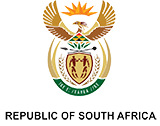Dear Fellow South African,
I was recently shown an inspiring and deeply touching post on a Facebook group for participants in government’s school assistant programme.
At the end of this month, the second cohort of 245,000 young people will finish their ten-month placement in schools. They will join the ranks of approximately 600,000 young South Africans that have participated in the initiative since its launch in 2020.

To encourage those leaving the programme, a young man from Modimolle in North West wrote in the Facebook post: “Don’t forget what you’ve done for the teachers and the learners. Don’t forget what you did for the school. Don’t forget the lives you have impacted. Don’t forget the tremendous difference you’ve made. But most importantly, don’t forget the skill and the experience you got from the school.”
This young man’s words capture the essence of this outstanding programme. The school assistant programme is part of the Presidential Employment Stimulus, the largest youth employment intervention in our country’s history, which has to date reached close to a million participants.
The school assistants have either supported teachers in the classroom or performed school maintenance, security, food garden production and other upkeep activities.
Updates sent by participants to the Department of Basic Education show the impact the initiative has had on more than 22,000 participating schools around the country. There are images of new libraries and reading corners. There are before-and-after pictures of barren school grounds now bursting with cabbages and of once dilapidated classrooms gleaming with new paint. There are videos of newly-trained sports enrichment coaches running exercise classes and participants at laptops doing school administration.
There are the stories of young South Africans who had been struggling to find work, and now have been able to make modest extensions to their homes, start small businesses or further their studies. One young participant with a mild mental disability said that he had been surviving off a disability grant and never thought he would be considered for the programme.
Of approximately 60,000 teachers and principals surveyed, more than 95% say the programme has greatly improved the learning environment in our schools and want it to continue. They say it has enabled them to focus more of their time on teaching.
Beyond the monthly stipend, the programme has provided young people with work experience and skills. They have received accredited training across several disciplines, ranging from digital literacy to basic bookkeeping, from child and youth care to bricklaying, plastering and plumbing.

As one participant said: “My CV is no longer empty. Before this programme it was blank, now it has five certificates.”
Having provided opportunities to these thousands of young people, we now need to open their path to formal employment, further education or entrepreneurship.
There are already many opportunities for people leaving the programme. The Youth Employment Service aims to place many of these young people in work experience positions in companies and the National Youth Development Agency will help those with business ideas.
Participants get information on scholarships and bursaries for further study and organisations in the wider education sector are looking to absorb participants into literacy and library programmes.
At NYDA's Presidential #YouthDay event, President Ramaphosa spoke about YES and the difference it is making in the lives of South African youth and the country at large. #ThisIsProgess. #SayYES. Listen now👇🏾. @CyrilRamaphosa @ravi_naidoo @Lemery20 pic.twitter.com/9we6hOA3yM
— Yes4Youth (@Yes4YouthZA) June 20, 2022
I am calling on all our partners, especially business, to harness the energies, talent, skills and experience of these young people to grow our economy. The quality work experience and training provided by this programme addresses the concerns of many businesses that young applicants lack skills and experience.
We call on businesses to participate in this process by taking advantage of the Employment Tax Incentive to hire more young people and create learnerships. They can use the SAYouth.mobi platform to publicise opportunities that exist in their companies. There are currently 2.9 million young people registered on SAYouth.mobi and many organisations, companies and departments use the platform to provide opportunities to young people.
The platform is part of the Presidential Youth Employment Intervention, which brings together several government departments, the National Youth Development Agency, the Harambee Youth Employment Accelerator, Jobs Fund, the Youth Employment Service, National Business Initiative and Confederation of Associations in the Private Employment Sector, among others, to create pathways for young people into earning opportunities.
I have been greatly encouraged by the many online groups formed by former participants of the programme where they share work, training and other opportunities among themselves. Some of these young people would have liked to be on the programme longer. One person writes that she was grateful to have been given the opportunity, but understands that others need to be given the same opportunity in the next intake.
As the young man from Modimolle wrote: “Some of you got better opportunities. Some of you chose to further your studies. Some of you decided to come together to start businesses. Your minds are open right now.”
As we build on the successes of this programme and bring opportunities to more young South Africans, I call on all of society – whether as businesses, community-based organisations or places of learning – to be part of building a new future for our young people.

Let us all do what we can to help these young people build their confidence, find decent work and bring dignity to their lives.
With best regards,
With best regards,

- Tags:
- Employment /
- Jobs /
- Youth /
- Education /
- Presidential Employment Stimulus /
- Youth employment programme
Tweet



